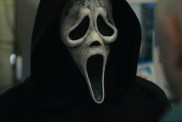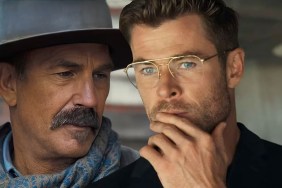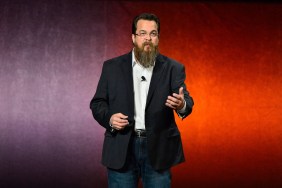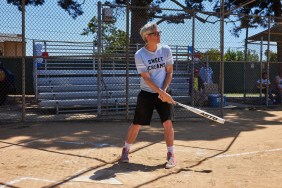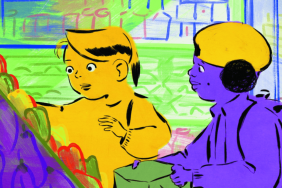
The Western genre has had its ups and downs, especially in recent years, when it’s a pretty big deal when a filmmaker decides to go the Western route… and yet, there seem to be less Westerns than ever, which is why Scottish filmmaker John Maclean’s Slow West is such a joy.
A former member of the Beta Band, Maclean made two short films with Michael Fassbender before casting him in Slow West as Silas, a renegade bounty hunter who offers to escort a young man named Jay Cavendish (Kodi Smit-McPhee) across the dangerous Colorado plains in search of his childhood sweetheart who has come to America with her father only to become wanted criminals.
It’s likely to be added to the list of memorable modern-day Westerns thanks to Maclean’s unique approach to the genre that probably shows how things really were in those tough times than the more glamorized visions of the West we’ve often seen in movies.
ComingSoon.net spoke with Maclean a few weeks back as the film was continuing its short but acclaimed festival run at New York’s Tribeca Film Festival.
ComingSoon.net: I didn’t know about your background as a member of the Beta Band, so how did you transition into filmmaking? I know you did a couple short films with Michael Fassbender and I assume you did some of the videos for the Beta Band.
John Maclean: Yeah, I did about 80-90% of the videos for the Beta Band and the Aliens. I think even the very first Beta Band video I did, so that was the film school was the Beta Band videos actually, and then slowly got more interested in the videos, then the studio. But I had sort of an art school background so I was certainly more comfortable in visual than audio. Yeah, so when the Beta Band split up, I wasn’t super good enough at an instrument to start joining other bands. I was much more interested in the film stuff by then, so just slowly chipped away.
CS: And you did those two shorts with Michael Fassbender, probably early enough that he really exploded. I know he had been working for a while…
Maclean: Yeah, well, I think he was shooting Tarantino (Inglourious Basterds) around the first one, so he certainly didn’t have to give a day for me. It was a really kind gesture really, because he was already on that ladder in a way, and busy, so I got one day with him for the first one and then it went well, so I managed to get three days for the second one. And that went well so…
CS: I understand you actually wrote the part of Silas for him?
Maclean: I did, yeah.
CS: But isn’t that odd to write something for an actor who can always say “No” or they’re busy and then you’re stuck having to find someone else?
Maclean: I think because we’d done the first short film together and it went well and then because we did the second short film through his production company, it almost felt like slightly the point was to then do a feature eventually. And then he came on as executive producer quite early on, so it did feel like he wasn’t going to turn around and just say “no.” It felt partly like he was seriously invested in this project, so it was a case of trying to make it work. Yeah, I was very lucky in that respect, so I could write for him.
CS: What made you want to do a Western? The genre has a storied history in movies. You never know if people want to see a Western from one day to the next.
Maclean: I know. (laughs) I wasn’t too concerned about how many people were going to come and see it, because I think that always depends whether the film is any good or not, regardless of the genre. I really think so. It felt quite intimidating turning up at Sundance as a Scottish guy with a Western that I hadn’t really shown it to anyone yet ‘cause it is kind of a sacred genre in American cinema. I think, ‘cause I kind of thought of how to tell it with an element of truth which was a European view on the West and very much sort of a tourist idea and all my travelling with the Beta Band. I traveled America before the Beta Band and loved it and was interested in traveling America so it’s always been there, this idea of traveling America.

CS: Did you get out to places like Colorado?
Maclean: Yeah, with the Beta Band, but also, before the Beta Band existed, a few of us on a gap year, we took cars from one city to the next for people and we got around to Colorado, the whole state actually.
CS: It’s interesting you say that you’re an outsider doing this but one of the chief elements of the movie is the immigrant experience and how they came to America and were so poor they’d turn to crime and dying. You are showing a different viewpoint than an American filmmaker saying “Yes, the West was great.”
Maclean: Yeah, there is that. When I did travel America, most people we met would say, “My grandfather was Irish” or “My great-grandfather was Scandinavian,” so you did sense that history there that maybe didn’t ring so true with many Westerns. Some Westerns point to it, like “McCabe and Mrs. Miller” has a bit of that, but definitely I thought there was something to say there.
CS: Australians have created their own subgenre of Westerns because there was obviously stuff going on down there. You have an Australian lead actor playing Scottish and I was curious how you ended up with Kodi, who has been in amazing movies for years now.
Maclean: I guess this started off when I decided that I wanted to shoot in New Zealand for various reasons. Then I had to start looking into using New Zealand and Australian cast for a lot of the parts, and then when Kodi was put forward, he was kind of uniquely right for the role physically and things he was saying. He was quite close to the character actually. His view of the world is quite… to look at the stars really. I think it’s quite tough to find a younger actor that has that experience that can work with Michael and hold his own and still be 17 years old. Because of his experience, he was working with Viggo and other people, and then a lot of 17-year-old actors seem to go and spend a lot of time in the gym these days (chuckles) and I wanted somebody who was a bit more fragile, so he ticked a lot of boxes.
CS: Other than Michael, was pretty much everyone else from Australia and New Zealand?
Maclean: Yeah, yeah. Without giving the game away… I mean, Caren Pistorious, the girl who has gotten an impeccable Scottish accent is South African-New Zealand.
CS: What was it like shooting in New Zealand and is it easier to recreate the Old West there? From the movie, it looks like there are a lot of areas that haven’t been touched.
Maclean: Yeah, it is that and I would have loved to shoot in Colorado, but first of all, I had a window to shoot with everyone, everything came together in October/November, which was the summer in New Zealand vs. winter in Colorado. It just felt more doable, and then you can find all those different locations in a smaller area. In Colorado, it’s forest for ten hours before you suddenly hit a plain and then it’s plain for ten hours… whereas New Zealand was a bit more manageable I think, the locations. It was funny as well, because I was shooting into some really scrubby woods where behind would be lakes and mountains and the most beautiful scenery ever, but I wasn’t making a New Zealand tourist video, so it was pointing the camera the other way and don’t get seduced by the landscape.
CS: Did you have to do a lot of research into those times?
Maclean: Yeah, when I was writing, I read, but I sort of avoided reading mythic views of the history of the West and tried to read a lot of stuff written at the time, so a lot of Ambrose Pierce and Nathaniel Hawthorne and Mark Twain. I think the main one was actually “Little House on the Prairie,” those books are great and they were the most informative and interesting.
CS: Well, those are very character-driven and all about the relationships between the characters. I was surprised when I saw the movie for a second time that Ben Mendelsohn’s character doesn’t show up for about 40 minutes. I somehow remember him being in the whole movie, but it was an interesting decision to have them go through so much and then having him show up.
Maclean: Yeah, I guess I wanted to stack up the thing so there’s a bit of time for travel and a bit of time for Jay and Silas to have the buddy movie element and then slowly started throwing in the danger along the way.
CS: Without giving too much away, the last ten to fifteen minutes are astounding, and it’s a pretty grim way to end the movie. Did you feel that was necessary to keep the tone of what you wanted to do?
Maclean: Yeah, that was there from the beginning and I think one of the main influences was “Assault on Precinct 13,” the Carpenter, and before that, “Rio Bravo,” but “Assault on Precinct 13” was one of my favorite films, and I did think that the audience and my love of that kind of cinema didn’t deserve an old-fashioned shoot-out. That was fun to shoot and fun to write, but I didn’t want to… like in a lot of shoot-outs just have cameras trying to follow the action. It’s mayhem, but I wanted it sort of choreographed, so I did work quite a long time on all the different elements and all the different deaths being quite different from each other.

Maclean: When I was writing it, I did sort of want to, in my reading, I did see that these people are traveling far distances and any kind of shooting and mayhem seems to be drunken, someone stumbling into someone and the gun mistakenly goes off or they shoot them in the back. It’s not really the fastest gun stuff. It doesn’t really equate with the history so much, so I did sort of think it would be nice to highlight that kind of thing, but mainly I just quite liked the words as well. “Slow West.” I just thought maybe some people would be put off with ‘slow” in the title (laughs)… more fool them, I dunno.
CS: It’s an interesting title and it makes one more interested in it, especially if you’re a fan of Westerns. It’s funny you should mention “Assault on Precinct 13,” because I don’t think anyone saw that movie when it was first released, but I’ve spoken to so many filmmakers on whom that has had a huge influence. I think everyone who saw that movie must have become a filmmaker.
Maclean: There’s a guy called Alex Cox and he had this thing called “Moviedrome” in the UK in the ‘80s and he showed that and that was the first time I saw it and I was like “Wow.“
CS: So he did a night of movies where he picked what to show?
Maclean: Yeah, he did a TV show where he picked a different movie once a week and they were always brilliant. It was called “Moviedrome” and it was amazing. I saw some great films on that. That’s the kind of thing that’s lost on today’s TV—giving people like that a show.
CS: They don’t even really have movies on television anymore. Obviously you have cable, but the networks like ABC and NBC used to show movies during prime time. Considering your music background, how involved were you in figuring out the music and what you wanted?
Maclean: Yeah, music, it was tough, because I couldn’t find anything for ages in the edit so I really wanted to make the film work without music, so I kind of kept music off until the very end, and then I knew that I wanted, like the film, the European influence and kept away from Moricone because he’s done that and you can’t emulate that really. So I kind of started thinking that the film suited a 3:4 waltz kind of style. I collect film soundtracks and I’m totally obsessed with film music, and again, I like the glory days of melody in film soundtracks where it was maybe a tune you could whistle. When I met Jed (Kurzel), who scored the film, that was my two things: 3:4 and something melodic.
CS: He’s Australian and he does movies with his brother.
Maclean: Yeah, he did “Snowtown” with his brother Justin, and again, it started off being through the Australian production company and I had met Justin a few times. I met Justin one night and he said “What about my brother? We’re doing ‘Macbeth’ and he’s got a few weeks off. Why don’t you try him?” It was the opposite of the “Snowtown” soundtrack which is very drony and atmospheric and I wanted something melodic and written, but he turned up with that in about three days. First time he hit the nail on the head and I absolutely loved it.
CS: Do you have any thoughts on what you want to do next?
Maclean: Not another Western. (chuckles)
CS: Not many filmmakers make two Westerns in a row. I mean, you have the classics but these days, you make a Western and then you do something else.
Maclean: Just because I like to read up about stuff and get into a new area, so maybe something contemporary and something crime or noir or heist. I do love that cinema as well.
CS: Are you reading a lot of scripts or do you really want to develop your own thing?
Maclean: I think so. I think I’d like to start writing again unless someone handed me something as good as “Chinatown,” then I’ll say “yes.”
Slow West opens in select cities on Friday, May 15, following its run on DIRECTV. You can watch and read our earlier interviews with actors Michael Fassbender and Kodi Smit-McPhee right here. Look for one more interview with Ben Mendelsohn, the film’s main antagonist, later this week.
Slow West
-
Slow West 1

-
Slow West 2

-
Slow West 3

-
Slow West 4

-
Slow West 5

-
Slow West 6

-
Slow West 7

-
Slow West 8

-
Slow West 9

